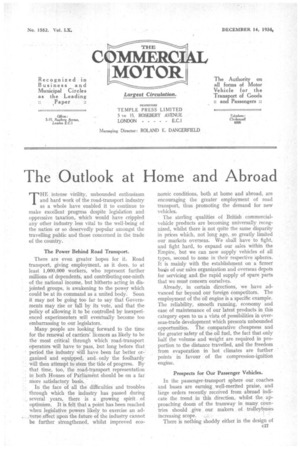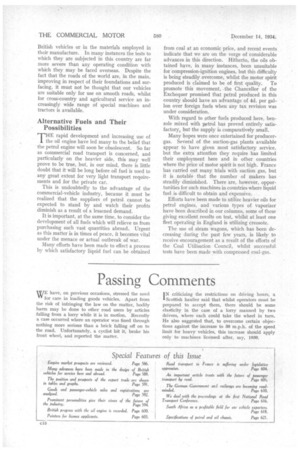The Outlook at Home and Abroad
Page 71

Page 72

If you've noticed an error in this article please click here to report it so we can fix it.
THE intense virility, unbounded enthusiasm and hard work of the road-transport industry as a whole have enabled it to continue to make excellent progress despite legislation and oppressive taxation, which would have crippled any other industry less vital to the well-being of the nation or so deservedly popular amongst the travelling public and those concerned in the trade of the country.
The Power Behind Road Transport.
There are even greater hopes for it. Road transport, giving employment, as it does, to at least 1,000,000 workers, who represent further millions of dependents, and contributing one-ninth of the national income, but hitherto acting in disjointed groups, is awakening to the power which could be at its command as a united body. Soon it may not be going too far to say that Governments may rise or fall by its vote, and that the policy of allowing it to be controlled by inexperienced experimenters will eventually become too embarrassing to our legislators.
Many people are looking forward to the time for the renewal of carriers' licences as likely to be the most critical through which road-transport operators will have to -pass, but long before that period the industry Will have been far better organized and equipped, and, only the foolhardy will then attempt to stem the tide of progress. By that time, too, the road-transport representation in both Houses of Parliament should be on a far More satisfactory basis, .
In the face of all the difficulties and troubles through which the industry has passed during several years, there is a growing spirit of optimism. It is felt that a point has been reached when legislative powers likely to exercise an adverse effect upon the future Of the industry cannot be further strengthened, whilst improved eco nomic conditions, both at home and abroad, are encouraging the greater employment of road transport, thus promoting the demand for new vehicles.
The sterling qualities of British commercialvehicle products are becoming universally recognized, whilst there is not quite the same disparity in prices which, not long ago, so greatly limited our markets overseas. We shall have to fight, and fight hard, to expand our sales within the Empire, but we can now supply vehicles of all types, second to none in their respective spheres. It is mainly with the establishment on a firmer bas,i.s of our sales organization and overseas depots for servicing and the rapid supply of spare parts that we must concern ourselves.
Already, in certain directions, we have advanced far beyond our foreign competitors. The employment of the oil engine is a specific example. The reliability, smooth running, economy and ease of maintenance of our latest products in this category open to us a vista of possibilities in overseas-trade development which presents unbounded' opportunities. The comparative cheapness and the greater safety of the oil fuel, the fact that only half the volume and weight are required in proportion to the distance travelled, and the freedom from evaporation in hot climates are further points in favour of the compression-ignition engine.
Prospects for Our Passenger Vehicles.
In the passenger-transport sphere our, coaches and buses are earning well-merited praise, and large orders recently received from abroad indicate the trend in this direction, whilst the approaching doom of the tramway in many countries should give our makers of trolleybuses increasing scope. There is nothing shoddy either in the design of British vehicles or in the materials employed in their manufacture. In many instances the tests to which they are subjected in this country are far more severe than any operating condition with which they may be faced overseas. Despite the fact that the roads of the world are, in the main, improving in respect of their foundations and surfacing, it must not be thought that our vehicles are suitable only for use on smooth roads, whilst for cross-country and agricultural service an increasingly wide range of special machines and tractors is available.
Alternative Fuels and Their Possibilities
THE rapid development and increasing use of the oil engine have led many to the belief that the petrol engine will soon be obsolescent. So far as commercial road transport is concerned, and particularly on the heavier side, this may well prove to be true, but, in our mind, there is little doubt that it will be long before oil fuel is used to any great extent for very light transport requirements and for the private car.
This is undoubtedly to the advantage of the commercial-vehicle industry, because it must be realized that the suppliers of petrol cannot be expected to stand by and watch their profits diminish as a result of a lessened demand.
It is important, at the same time, to consider the development of all fuels which will relieve us from purchasing such vast quantities abroad. Urgent as this matter is in times of peace, it becomes vital• under the menace or actual outbreak of war.
Many efforts have been made to effect a process by which satisfactory liquid fuel can be obtained from coal at an economic price, and recent events indicate that we are on the verge of considerable advances in this direction. Hitherto, the oils obtained have, in many instances, been unsuitable for compression-ignition engines, but this difficulty is being steadily overcome, whilst the motor spirit produced is claimed to be of first quality. To promote this movement, the Chancellor of the Exchequer promised that petrol produced in this country should have an advantage of 4d. per gallon over foreign fuels when any tax revision was under consideration.
With regard to other fuels produced here, benzole mixed with petrol has proved entirely satisfactory, but the supply is comparatively small.
Many hopes were once entertained for producergas. Several of the suction-gas plants available appear to have given most satisfactory service, but the extra attentfon they require has limited their employment here and in other countries where the price of motor spirit is not high. France has carried out many trials with suction gas, but it is notable that the number of makers has steadily diminished. There are, however, opportunities for such machines in countries where liquid fuel is difficult to obtain and expensive.
Efforts have been made to utilize heavier oils for petrol engines, and various types of vaporizer have been described in our columns, some of these giving excellent results on test, whilst at least one fleet operating in England is utilizing creosote.
The use of steam wagons, which has been decreasing during the past few years, is likely to receive encouragement as a result of the efforts of the Coal Utilisation Council, whilst successful tests have been made with compressed coal-gas.




































































































































































